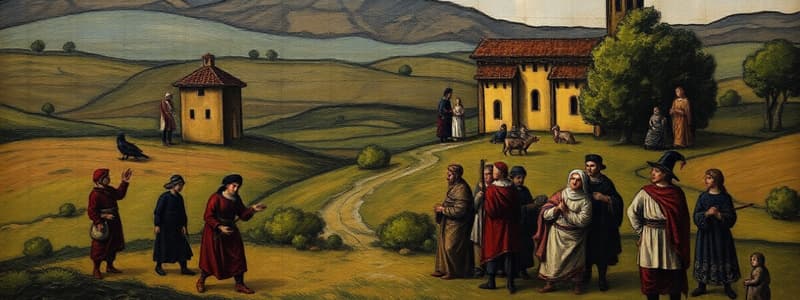Podcast
Questions and Answers
Which factor was LEAST influential in the Franks becoming the most dominant tribe in early medieval Europe?
Which factor was LEAST influential in the Franks becoming the most dominant tribe in early medieval Europe?
- Their adoption of Christianity, which fostered alliances with powerful religious figures.
- Their advanced naval capabilities that allowed them to control sea trade routes. (correct)
- Their strong military and unified leadership, which enabled them to conquer and control vast territories.
- Their agricultural practices, which ensured a stable food supply and supported a growing population.
How did the emergence of Vulgar Latin during the Migration Period reflect broader societal changes?
How did the emergence of Vulgar Latin during the Migration Period reflect broader societal changes?
- It indicated a strengthening of centralized Roman authority and the preservation of traditional Roman values.
- It demonstrated a renewed interest in classical literature and the arts among the common people.
- It facilitated trade and communication across the newly formed Germanic kingdoms.
- It symbolized the blending of Roman cultural elements with the customs of various Germanic tribes. (correct)
How might the disruption of trade routes during the Migration Period have paradoxically contributed to the development of distinct regional identities in Europe?
How might the disruption of trade routes during the Migration Period have paradoxically contributed to the development of distinct regional identities in Europe?
- By forcing communities to become more self-sufficient, fostering unique local customs and dialects. (correct)
- By encouraging technological innovation in shipbuilding, leading to more efficient long-distance trade networks.
- By facilitating the widespread dissemination of Roman legal and administrative practices to new territories.
- By prompting the standardization of currency and trade regulations across different Germanic kingdoms.
What was the most significant impact of Clovis' conversion to Christianity on the development of the Frankish kingdom?
What was the most significant impact of Clovis' conversion to Christianity on the development of the Frankish kingdom?
Which of the following best explains the relationship between the decline of learning and the shift from cities to rural areas during the Migration Period?
Which of the following best explains the relationship between the decline of learning and the shift from cities to rural areas during the Migration Period?
Which factor was LEAST significant in the Franks becoming the most influential tribe in the early medieval period?
Which factor was LEAST significant in the Franks becoming the most influential tribe in the early medieval period?
How did Clovis strategically leverage religion to consolidate and expand his power as a Frankish leader?
How did Clovis strategically leverage religion to consolidate and expand his power as a Frankish leader?
What was the primary role of the Majordomos (Mayors of the House) during the later Merovingian period?
What was the primary role of the Majordomos (Mayors of the House) during the later Merovingian period?
Why was Charles Martel's victory at the Battle of Tours in 732 CE a pivotal moment in European history?
Why was Charles Martel's victory at the Battle of Tours in 732 CE a pivotal moment in European history?
How did Pepin the Short's relationship with the papacy differ from that of his predecessors, and what was the result of this?
How did Pepin the Short's relationship with the papacy differ from that of his predecessors, and what was the result of this?
What was Charlemagne's most significant contribution to the development of Western Europe, beyond territorial expansion?
What was Charlemagne's most significant contribution to the development of Western Europe, beyond territorial expansion?
Why did the Treaty of Verdun in 843 mark a significant turning point in the history of the Frankish empire?
Why did the Treaty of Verdun in 843 mark a significant turning point in the history of the Frankish empire?
What was the primary reason Louis the Pious struggled as a ruler compared to his father, Charlemagne?
What was the primary reason Louis the Pious struggled as a ruler compared to his father, Charlemagne?
Flashcards
Migration Period
Migration Period
A period of cultural and ethnic shifts from the 4th to 7th century, bridging late Ancient History and the early Middle Ages.
Causes of the Migration Period
Causes of the Migration Period
Invasions, search for fertile land, climate cooling, and Roman Empire weakness.
Outcomes of the Migration Period
Outcomes of the Migration Period
Settlements, new kingdoms, new culture (Roman + Germanic), vulgar Latin.
Changes in Europe Post-Migration
Changes in Europe Post-Migration
Signup and view all the flashcards
Roots of Medieval Society
Roots of Medieval Society
Signup and view all the flashcards
The Franks
The Franks
Signup and view all the flashcards
Clovis
Clovis
Signup and view all the flashcards
Majordomos
Majordomos
Signup and view all the flashcards
Charles Martel
Charles Martel
Signup and view all the flashcards
Pepin the Short
Pepin the Short
Signup and view all the flashcards
Charlemagne
Charlemagne
Signup and view all the flashcards
Louis the Pious
Louis the Pious
Signup and view all the flashcards
Treaty of Verdun (843)
Treaty of Verdun (843)
Signup and view all the flashcards
Study Notes
- Post fall of the Roman Empire, a new society emerged.
The Migration Period
- Occurred during the 4th-7th century
- Represented a cultural and ethnic change
- Was the transition period between Late Ancient History and the early Middle Ages
The Causes of the Migration
- Invasion of the Huns
- Search for fertile land
- General cooling of the climate
- Weakness of the Roman Empire
The Outcomes of the Migration
- Tribes did not destroy areas, but settled them
- New kingdoms were created
- A new culture emerged - Roman culture + Germanic customs
- Creation of a single language: Vulgar Latin (language of common people)
The Changes in Europe
- Disruption of trade: the economy was disrupted by wars among the Germanic tribes
- Downfall of cities: people moved to the countryside and the cities were abandoned and lost their importance.
- Decline of learning: at first, skills like reading and writing were not very important
- The loss of common language: people started to use local languages instead of Latin
- Roots of the medieval society:
- The classical heritage of Rome
- The benefits of the Roman Catholic Church
- The customs of the various Germanic tribes
The Franks
- The most influential tribe:
- Military power: they had a well-trained army
- Farming: they were not only fighting but also farming
- The rule of strong leaders united the Frankish tribes
- Religion: they adopted Christianity
Clovis
- First Christian leader
- Gained the support of the Pope with a strategic alliance
- Latin became the official language
- There was territorial expansion
The Majordomos - The Mayors of the House
- Was a governmental office held by a noble man
- Were the most powerful people in the Frankish kingdom during the decline of royal power
- They were in charge of the royal court, household, and estates
- The most important function was the military leadership
Charles Martel
- Mayor of the House
- Was more powerful than the king and supported by the Pope
- Enlarged the territory
- Most important battle: the Battle of Tours in 732
- Army defeated Muslim raiders who had conquered Spain in 711
- Victory stopped the Muslim expansion in Europe
Pepin the Short
- Mayor of the House
- Enlarged the territory
- Cooperated with the Pope
- His achievements brought him fame and power
- The Pope gave him the title of
- Started the new dynasty: Carolingian dynasty
Charles the Great - Charlemagne
- Limited the power of nobles
- Supported education, established many schools
- Built the greatest Empire in Western Europe: Holy Roman Empire
- Pope crowned him the Emperor
Louis the Pious
- Religious but an ineffective ruler
- Was not supported by his subjects
- Had three sons: Lothair, Charles the Bald, and Louis the German
- His sons were supposed to rule together, but they fought against each other.
- They decided to divide the Empire into three kingdoms.
- They signed the Treaty of Verdun in 843 where three kingdoms were established:
- West Frankish Kingdom ruler: Charles the Bald
- Central Frankish Kingdom ruler: Lothair
- East Frankish Kingdom ruler: Louis the German
Studying That Suits You
Use AI to generate personalized quizzes and flashcards to suit your learning preferences.




